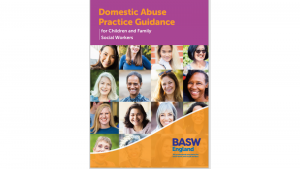BASW Blog: 'Deaf Survivors of Domestic Abuse – Are we Listening?'
It is unnerving to know that we may never grasp the true extent of domestic abuse. Some statistics indicate that as many as 1 in 3 women will experience it during their lifetime, though the true figure may be even higher.
Whilst we cannot be sure of numbers, there is one thing of which we can be certain - its devastating impact can be seen across every intersection of society. Anyone, regardless of age, gender, sexuality, race, culture or disability, can experience domestic abuse.
For marginalised groups such as the deaf community, perpetrators can further disempower victim-survivors in ways that social workers are not always aware of.
I am not afraid to admit that, prior to a recent workshop on supporting deaf survivors of domestic abuse delivered by deaf experts from Sign Health, this area was completely new to me.
I fear that my own ignorance is just the tip of the iceberg: deaf awareness training is still not mandatory in social work education, meaning most practitioners are ill-equipped when it comes to understanding the complex needs of this wonderfully resourceful, yet marginalised community.
The workshop opened my eyes to how deaf survivors face a double jeopardy; not only are they experiencing domestic abuse, but they are further disempowered by living in a society which consistently marginalises and excludes them.Rebekah Pierre, BASW England Professional Officer
How does domestic abuse differ for deaf victim-survivors?
The workshop opened my eyes to how deaf survivors face a double jeopardy; not only are they experiencing domestic abuse, but they are further disempowered by living in a society that consistently marginalises and excludes them. As a result, survivors are often reliant on perpetrators for financial resources (given they are much more likely to face discrimination in the workplace), navigating everything from GP calls to bills, and accessing information.
The Covid-19 government briefings were a prime example of just how inaccessible crucial and potentially life or death information is for deaf people. It is well-known that the government failed to ensure British Sign Language (BSL) interpreters were available for many of these rapidly evolving updates.
It led to the deaf community being dubbed COVID’s forgotten victims. Though I’m not quite sure the term fits, as this would imply that deaf people were not already forgotten long before the pandemic.
Communication was another area which the workshop highlighted as a means for perpetrators to assert control. I had never considered the fact that for many deaf people, English is a second language. It has its own structure, grammar and even tenses which are distinct. For example, in English you might say ‘I went to the shop’, whereas in BSL this would be ‘I go shop’. Perpetrators can and do exploit this linguistic difference by insisting on speaking on behalf of deaf people, excluding them from conversations or even preventing them from speaking to their own children.
I was previously unaware that the average reading comprehension for a deaf person is 9-years old. In a bureaucratic world, deaf people are often at the mercy of perpetrators when it comes to everyday tasks.
As social workers who adhere to a code of ethics, we may assume that we are the exception to the rule when it comes to the discrimination faced by deaf people – but the workshop highlighted that this was not the case.
It goes without saying that reading child protection reports, court documents or assessments can be intimidating for anybody to read.
Yet such documents are rarely translated into BSL. This has led to some parents unknowingly signing section 20 documents, child protection agreements, or even court documents without fully understanding the content.
And even when it comes to interpersonal communication, there were reports that social workers had, in the past, asked perpetrators to act as interpreters, tilting the power dynamic even further in the perpetrator's favour. Children have, on occasion, also be asked to step in as interpreters - which is not only wholly inappropriate but potentially traumatic.
Without fair access to interpreters, advocates and accessibility tools, deaf survivors will continue to be let down by services.
Without fair access to interpreters, advocates and accessibility tools, deaf survivors will continue to be let down by services.Rebekah Pierre, BASW England Professional Officer
Top tips for improving practice with deaf children and families
As we strive to be person-centred and anti-discriminatory profession, it is essential that we listen to the deaf community, who are experts on what they need.
For Top Tips and key messages from deaf experts themselves, check out pages 23-24 of BASW’s Domestic Abuse Practice Guide, which was written in partnership with Sign Health.

Domestic abuse: How social workers can better support marginalised groups
BASW England recently launched domestic abuse practice guidance, with a focus on how best to support marginalised groups including d/Deaf and disabled, Black and minoritized, LGBT+ communities.
Social workers are encouraged to read the guide, which includes top tips from survivors, research, models, tools and a refresh of 2021 Domestic Abuse Act legislation.
This was the first in a series of domestic abuse workshops providing training on supporting marginalised groups – you can book onto our next sessions on supporting LGBT+ and Black and Minoritised victims:
- Supporting LGBT+ Survivors of Domestic Abuse – In partnership with Galop
Tuesday, 7 September 2021 - 10:00am to 1:00pm
* Book your place * - Supporting Black and Minoritised Survivors of Domestic Abuse – In partnership with Southall Black Sisters
Friday, 15 October 2021 - 9:30am to 12:30pm
* Book your place *